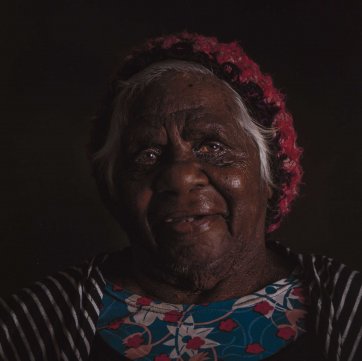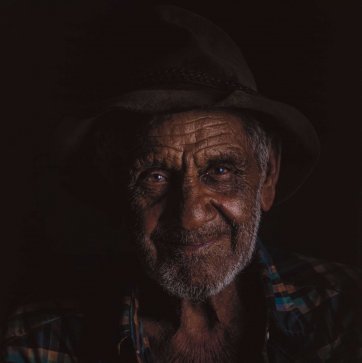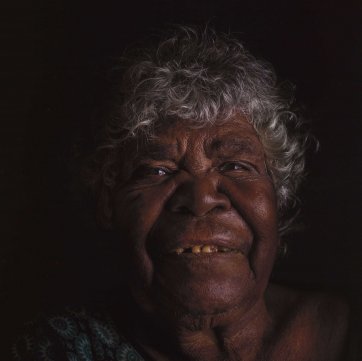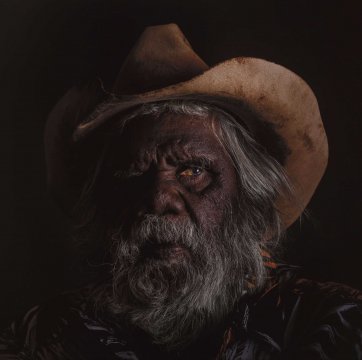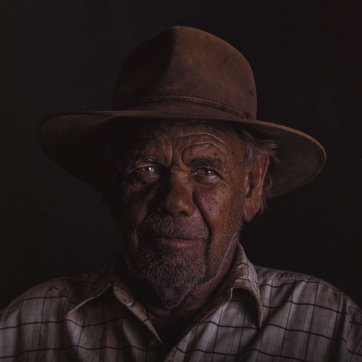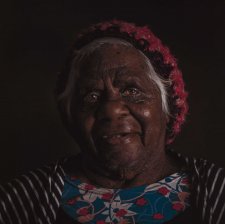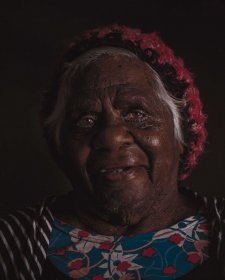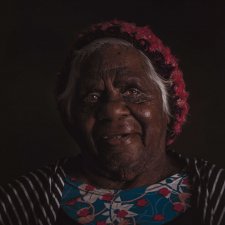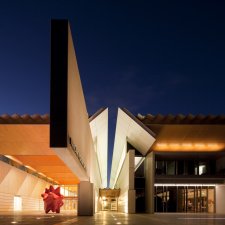- I would like to acknowledge the traditional owners of this country as I stand on in order to be part of this, and to be acquired by The National Portrait Gallery of Canberra. It is an honour to showcase the beauty of my mayatja, Anangu mayatja, wati, minyma, kungka. Meaning the elders, the men, the women, and the younger generation of women, and the brother in there, marutjue. And then to capture the beauty and the essence of these people, it was about empowerment. It was about the subject matter. It was about holding onto the importance of who we are as Anangu. In front and behind the lens. How the lens can capture the beauty and the story of one side face. If you look at the photographs, you know you've captured the beauty of either the left or the right. It's about the kuru. Looking deep within the eye of a person. And that person is not only a person but it is a person of significance, of Tjukurpa, story, Inma, song, Miil-miilpa, sacredness of the individual, what their duty, what their responsibility lies within themselves. So that's the story about what I've captured. It's about empowerment. And it's found a place of prestigiousness. And those photographs weren't all taken in one studio. Those photographs was taken in three parts of a studio. But I must also say my wife was also with me, Kaye Victoria Lowah. That me and Kaye travelled under Mimili Maku Arts' name, and we went to four communities. We went to Indulkana. Obviously we went to Mimili community, but we also went to Ernabella community, Pukatja. And we also went to Amata. And to come into one's space, it's very intimidating for me. Ngayulu kuntaringu. I get shamed to ask. But I had to ask for permission to capture. And once they gave me that opportunity to capture and to photograph these people in their place, and space, and time, and canvas, and everyone was working at that time in that place. And they only gave me five minutes of their time. Only five minutes, those photographs. 10 minutes, those photographs. Was given because we just Uber Eats, we just went boof boof, in and out. But that's how quick it was. Those photographs was captured in 10 to 15 minutes per person. And because I mastered the ISO, mastered the skills of this, it's been a while, I'm bit crusty now with the camera. I haven't touched the camera for a while. But when I have that opportunity, I work with two elements. I work with the moon, I work with the sun. And it's unreal that I wouldn't be sitting here today if it wasn't for those people in that corridor, first corridor as you walk into this building. And to have that honour, it's a testimony that I captured the time, the place, the moment, Iriti, ngula, kuwari. Or Iriti, kuwari, ngula. Iriti - old, kuwari - now, ngula in the future - Palya. And we have all these outlets and all these things of the diversity and the beauty of art and photography. It's just people are just pushing boundaries. And it's not only photography. It's not only painting, it's sound, it's music, it's football, it's running. And to have all that, it's art is about sponsorship. It's looking after the ones in our community. And there's so much, so much. So it relates to who I am as an artist also, that. Mimili and the people that we work with, we are pushing boundaries. And I'm glad that I am pushing boundaries and pushing places of things. Because I have someone that can help me push those boundaries. When I push those boundaries, we are pushing these boundaries together, Ngapartji, ngapartji. 50/50. And it's about appreciating. 'Cause I've learned to forgive. The hardest thing in life is to forgive. And if you can forgive, you know your works will travel. And I didn't realise how important my work was until my friend, "Robert, the timing is not right. "The timing is not right." The timing is now. I've seen it. But I could sit here and talk all day about APY lands and the importance of Indulkana, the importance of Mimili, Fregon, Ernabella, Amata, Kanpi, Nyapari, Pipalyatjara, Warburton Ranges, Ntaria Hermannsburg, Yuenduumu, Papunya. We all good at our work because we all follow our cultures. We follow one Tjukurpa, transition. And holding onto, kanyintjaku, holding onto the importance of culture and looking after one another. Palya. I can keep rawa, but wanti.
- [Producer] No, that was really great.
